Join our list
Subscribe to our mailing list and get interesting stuff and updates to your email inbox.
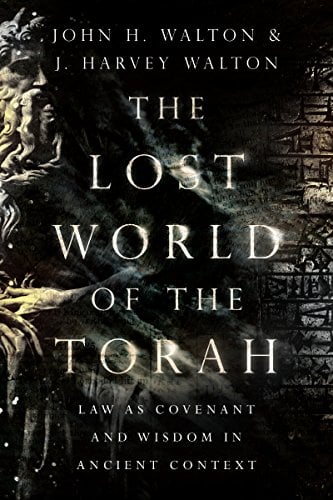 Author(s): John Walton and Harvey Walton
Author(s): John Walton and Harvey WaltonPublisher: IVP Academic
Price: $2.99 (Oct 29-30)
Our handling of what we call biblical law veers between controversy and neglect.
On the one hand, controversy arises when Old Testament laws seem either odd beyond comprehension (not eating lobster) or positively reprehensible (executing children). On the other, neglect results when we consider the law obsolete, no longer carrying any normative power (tassels on clothing, making sacrifices). Even readers who do attempt to make use of the Old Testament “law” often find it either irrelevant, hopelessly laden with “thou shalt nots,” or simply so confusing that they throw up their hands in despair. Despite these extremes, people continue to propose moral principles from these laws as “the biblical view” and to garner proof texts to resolve issues that arise in society. The result is that both Christians and skeptics regularly abuse the Torah, and its true message often lies unheard.
- Share
- Like
- Tweet
- Digg
- Tumblr
- VKontakte
- Buffer
- Love This
- Odnoklassniki
- Meneame
- Blogger
- Amazon
- Yahoo Mail
- Gmail
- AOL
- Newsvine
- HackerNews
- Evernote
- MySpace
- Mail.ru
- Viadeo
- Line
- Comments
- SMS
- Viber
- Telegram
- Subscribe
- Facebook Messenger
- Kakao
- LiveJournal
- Yammer
- Edgar
- Fintel
- Mix
- Instapaper
- Copy Link
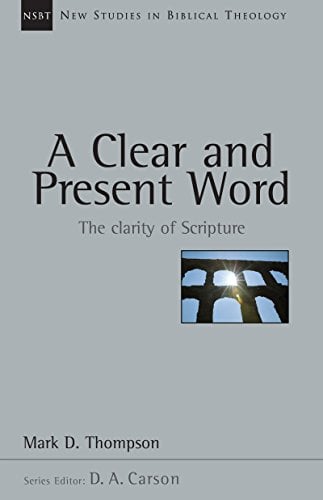 Author(s): Mark Thompson
Author(s): Mark ThompsonPublisher: IVP Academic
Price: $2.99 (Oct 21-22)
By almost any measure, a bold and confident use of the Bible is a hallmark of Christianity. Underlying such use are a number of assumptions about the origin, nature and form of the biblical literature, concerning its authority, diversity and message.However, a lack of confidence in the clarity or perspicuity of Scripture is apparent in Western Christianity. Despite recent, sophisticated analyses, the doctrine is ignored or derided by many. While there is a contemporary feel to these responses, the debate itself is not new.In this New Studies in Biblical Theology volume, Mark Thompson surveys past and present objections to the clarity of Scripture; expounds the living God as the Guarantor of his accessible, written Word; engages with the hermeneutical challenges and restates the doctrine for today.Addressing key issues in biblical theology, the works comprising New Studies in Biblical Theology are creative attempts to help Christians better understand their Bibles. The NSBT series is edited by D. A. Carson, aiming to simultaneously instruct and to edify, to interact with current scholarship and to point the way ahead.
- Share
- Like
- Tweet
- Digg
- Tumblr
- VKontakte
- Buffer
- Love This
- Odnoklassniki
- Meneame
- Blogger
- Amazon
- Yahoo Mail
- Gmail
- AOL
- Newsvine
- HackerNews
- Evernote
- MySpace
- Mail.ru
- Viadeo
- Line
- Comments
- SMS
- Viber
- Telegram
- Subscribe
- Facebook Messenger
- Kakao
- LiveJournal
- Yammer
- Edgar
- Fintel
- Mix
- Instapaper
- Copy Link
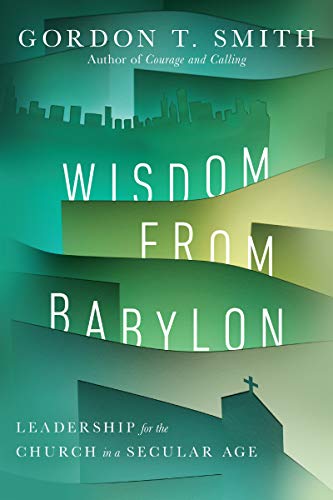 Author(s): Gordon Smith
Author(s): Gordon SmithPublisher: IVP Academic
Price: $2.99 (Oct 7-8)
What does it mean to provide leadership for the church in an increasingly secular context? When religion is privatized and secularism reigns in the public square, Christians are often drawn toward either individualist escapism or constant cultural warfare. But might this context instead offer a fresh invitation for the church to adapt and thrive?
Gordon Smith is passionate about the need for capable, mature leaders to navigate and respond to a changing society. In this book, he draws on his extensive experience as a university president, pastor, and international speaker to open a multidisciplinary conversation about the competencies and capacities essential for today’s leaders.
After analyzing the phenomenon of secularization in the West and charting common Christian responses, Smith introduces four sources of wisdom to help guide us through this new terrain: the people and prophets of Judah during the Babylonian exile, the early church in its pagan environment, contemporary churches across the Global South, and Christian thinkers in post-Christian Europe. From these resources he identifies practices and strategies—from liturgy and catechesis to mission and hospitality—that can give shape to faithful, alternative communities in such a time as this.
- Share
- Like
- Tweet
- Digg
- Tumblr
- VKontakte
- Buffer
- Love This
- Odnoklassniki
- Meneame
- Blogger
- Amazon
- Yahoo Mail
- Gmail
- AOL
- Newsvine
- HackerNews
- Evernote
- MySpace
- Mail.ru
- Viadeo
- Line
- Comments
- SMS
- Viber
- Telegram
- Subscribe
- Facebook Messenger
- Kakao
- LiveJournal
- Yammer
- Edgar
- Fintel
- Mix
- Instapaper
- Copy Link
 Author(s): Murray Harris
Author(s): Murray HarrisPublisher: IVP Academic
Price: $2.99 (Sept 16-17)
The New Testament finds many ways to depict the relationship of Christians and their Lord. They are his disciples, sons, daughters and friends. But it is perhaps too little recognized that they are also his slaves.In this New Studies in Biblical Theology volume, Murray J. Harris sets out to uncover what it means to be a slave of Christ. He begins by assessing the nature of actual slavery in the Greco-Roman world and the New Testament’s attitude towards it. Drawing insights from this, he goes on to unfold the metaphor of slavery to Christ. Among the topics discussed are slavery and spiritual freedom, lordship, ownership, and privilege.Slave of Christ is a model of good biblical theology, providing insights both for future study of the Bible and for practical application.Addressing key issues in biblical theology, the works comprising New Studies in Biblical Theology are creative attempts to help Christians better understand their Bibles. The NSBT series is edited by D. A. Carson, aiming to simultaneously instruct and to edify, to interact with current scholarship and to point the way ahead.
- Share
- Like
- Tweet
- Digg
- Tumblr
- VKontakte
- Buffer
- Love This
- Odnoklassniki
- Meneame
- Blogger
- Amazon
- Yahoo Mail
- Gmail
- AOL
- Newsvine
- HackerNews
- Evernote
- MySpace
- Mail.ru
- Viadeo
- Line
- Comments
- SMS
- Viber
- Telegram
- Subscribe
- Facebook Messenger
- Kakao
- LiveJournal
- Yammer
- Edgar
- Fintel
- Mix
- Instapaper
- Copy Link
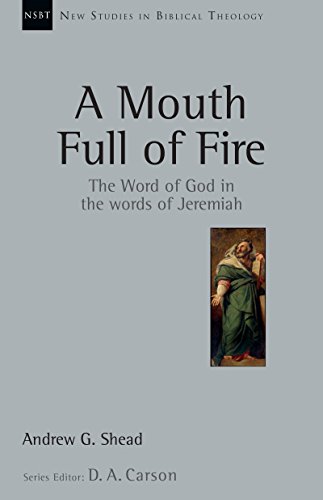 Author(s): Andrew Shead
Author(s): Andrew SheadPublisher: IVP Academic
Price: $2.99 (Sept 2-3)
“I am putting my words as a fire in your mouth; these people are tinder and it will consume them.” (Jeremiah 5:14)In the book of Jeremiah, not only is the vocabulary of “word” and “words” uniquely prevalent, but formulae marking divine speech also play an unprecedented role in giving the book’s final form its narrative and theological shape. Indeed, “the word of the Lord” is arguably the main character, and a theology that is both distinctive and powerful can be seen to emerge from the unfolding narrative.In this stimulating study, Andrew Shead examines Jeremiah’s use of word language; the prophet’s formation as an embodiment of the word of God; his covenant preaching and the crisis it precipitates concerning the recognition of true prophecy; and, in the “oracles of hope,” how the power of the word of God is finally made manifest.Shead then brings this reading of Jeremiah to bear on some issues in contemporary theology, including the problem of divine agency and the doctrine of Scripture, and concludes by engaging Jeremiah’s doctrine of the Word of God in conversation with Karl Barth. The prophet’s major contribution emerges from his careful differentiation of “word” and “words.”Addressing key issues in biblical theology, the works comprising New Studies in Biblical Theology are creative attempts to help Christians better understand their Bibles. The NSBT series is edited by D. A. Carson, aiming to simultaneously instruct and to edify, to interact with current scholarship and to point the way ahead.
- Share
- Like
- Tweet
- Digg
- Tumblr
- VKontakte
- Buffer
- Love This
- Odnoklassniki
- Meneame
- Blogger
- Amazon
- Yahoo Mail
- Gmail
- AOL
- Newsvine
- HackerNews
- Evernote
- MySpace
- Mail.ru
- Viadeo
- Line
- Comments
- SMS
- Viber
- Telegram
- Subscribe
- Facebook Messenger
- Kakao
- LiveJournal
- Yammer
- Edgar
- Fintel
- Mix
- Instapaper
- Copy Link
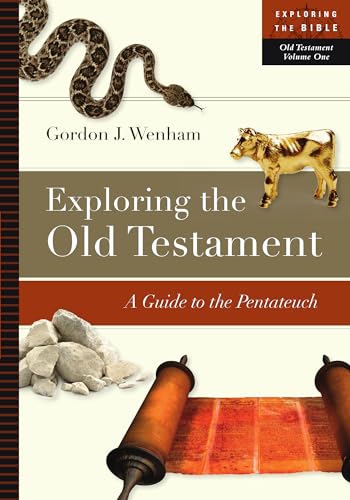 Author(s): Gordon Wenham
Author(s): Gordon WenhamPublisher: IVP Academic
Price: $2.99 (Aug 26-27)
Exploring the Old Testament: A Guide to the Pentateuch offers a clear overview of the “five books of Moses,” as well as an introduction to the historical and textual questions that modern scholarship has posed and the answers it has proposed.This critically informed, textually sensitive introduction to the Pentateuch introduces students to
the basic features of the Pentateuch
the social world of the Bible
the latest scholarship on the composition of the Pentateuch
literary techniques and forms
theme, composition and rhetorical function of the Pentateuch
In this textbook you will find double-column formatting for ease of use, annotated bibliographies for further reading, sidebar explorations of select historical and textual topics in greater detail, a glossary of terms, and relevant charts and maps.
- Share
- Like
- Tweet
- Digg
- Tumblr
- VKontakte
- Buffer
- Love This
- Odnoklassniki
- Meneame
- Blogger
- Amazon
- Yahoo Mail
- Gmail
- AOL
- Newsvine
- HackerNews
- Evernote
- MySpace
- Mail.ru
- Viadeo
- Line
- Comments
- SMS
- Viber
- Telegram
- Subscribe
- Facebook Messenger
- Kakao
- LiveJournal
- Yammer
- Edgar
- Fintel
- Mix
- Instapaper
- Copy Link
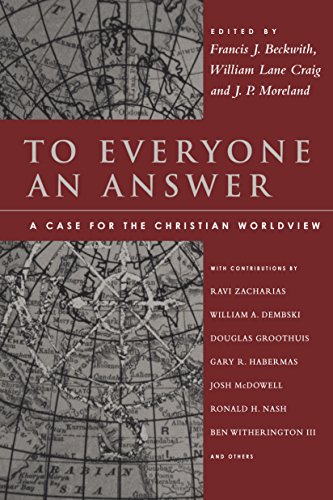 Editor(s): Francis J. Beckwith, William Lane Craig, J. P. Moreland
Editor(s): Francis J. Beckwith, William Lane Craig, J. P. MorelandPublisher: IVP Academic
Price: $2.99 (Aug 19-20)
In a society fascinated by spirituality but committed to religious pluralism, the Christian worldview faces sophisticated and aggressive opposition. A prior commitment to diversity, with its requisite openness and relativistic outlook, has meant for skeptics, critics and even many Christians that whatever Christianity is, it cannot be exclusively true or salvific.What is needed in this syncretistic era is an authoritative, comprehensive Christian response. Point by point, argument by argument, the Christian faith must be effectively presented and defended. To Everyone an Answer: A Case for the Christian Worldview offers such a response.Editors Francis J. Beckwith, William Lane Craig and J. P. Moreland have gathered together in this book essays covering all major aspects of apologetics, including:
- Share
- Like
- Tweet
- Digg
- Tumblr
- VKontakte
- Buffer
- Love This
- Odnoklassniki
- Meneame
- Blogger
- Amazon
- Yahoo Mail
- Gmail
- AOL
- Newsvine
- HackerNews
- Evernote
- MySpace
- Mail.ru
- Viadeo
- Line
- Comments
- SMS
- Viber
- Telegram
- Subscribe
- Facebook Messenger
- Kakao
- LiveJournal
- Yammer
- Edgar
- Fintel
- Mix
- Instapaper
- Copy Link


